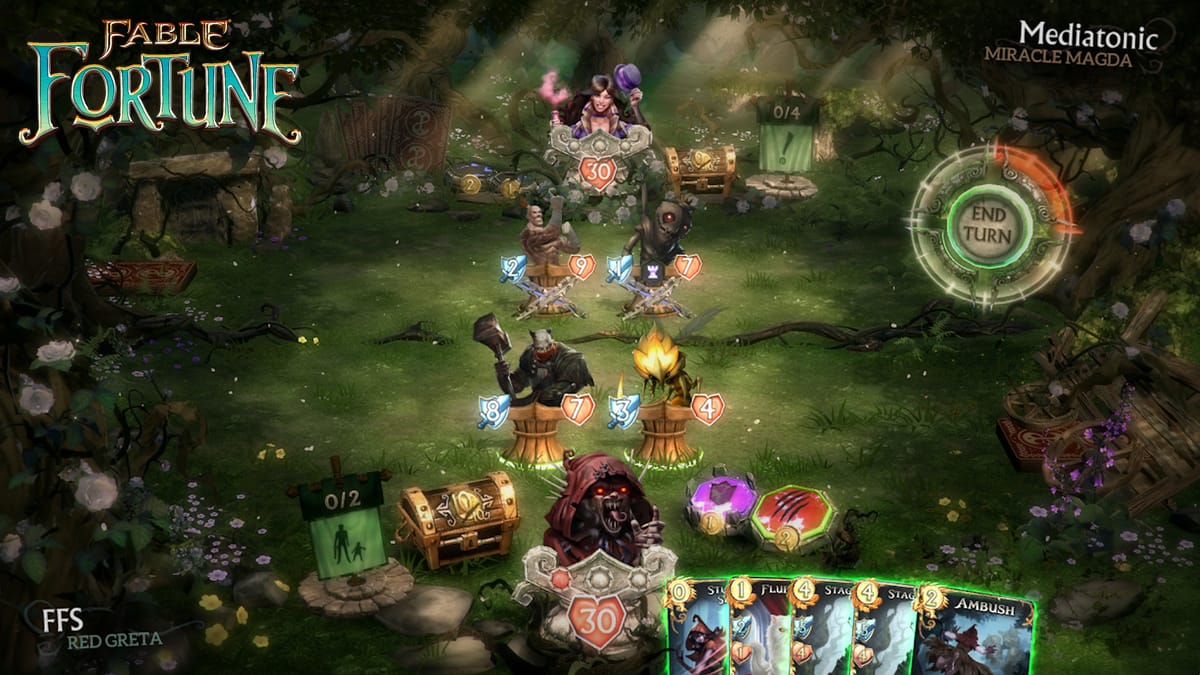
Digital card games have one major hurdle to cross if they want to stand out: being different from, or better than, Blizzard’s insanely popular Hearthstone. While Fable Fortune, a spin-off of the Fantasy RPG series Fable, doesn’t quite do that, it’s still fun and easy enough to recommend giving a play.
If there’s one real issue with the preview build of Fable Fortune, it’s that the game has a bit of a learning curve. While there may be a tutorial in later builds of the game, the one I played basically thrust me into the action with no real explanation of how the game was to be played. While the cards are informative enough, and a quick examination of the different character classes will give you some ideas as to the general play styles and builds, your first few matches are pretty sink or swim.
Fortunately, there is a reliable tutorial outside the game, and it’s one I mentioned in the first paragraph: Blizzard’s Hearthstone. Fable Fortune’s ruleset is so similar to Hearthstone that, at times, it feels like it runs dangerously close to a blatant rip-off. While you could make the argument that all combat based TCGs are pretty similar, and, in essence, all take a bit of inspiration from Magic: The Gathering, here it starts to feel a little too close for comfort. To give you an idea of what I mean, the mana system gains a point each turn and caps at 10, the life counter starts at 30, and there are multiple classes distinguished by specific exclusive cards and special abilities. This extends even to the little aesthetic touches, like cards having different voice lines when activated, attacking, or destroyed.
If you can get past that, however, there’s a lot to Fable Fortune. It’s rules are relatively simple once you play around with it a bit, and the few twists it puts on the gameplay really work. For example, there’s the way that it incorporates Fable’s classic “good vs. evil” choices. When you start, you can choose one of three goals to work toward, like spending a certain amount of coins (the stand-in for mana) or getting a certain number of specific creatures onto the field. Once you do that, you’re given a reward, as well as a choice: fulfill the goal in a good way, and get a bonus generally related to healing, or an evil way, and get a more destructive bonus, as well as some visual flair that indicates which side you chose. While it’s mostly just fluff, and the choice between the two isn’t really about morality as much as it is what your strategy needs to win the game right now, it’s still a neat little callback to the franchise, and it adds a long term goal to your strategy.
Another general thing to note is that, for some reason, rounds in Fable Fortune last a lot longer than ones in other digital TCGs, which, in my experience, tend towards faster, more arcady play. While the goals you need to reach do favor a more strategic outlook, I would say that this seems to be more influenced by the way that blocking works in this game. For one mana each turn, you can select any one creature on the field to guard, which means that it must be destroyed before your opponent can attack you or any other creature, but only until next turn. This can really halt the game’s process, as it seems like the best strategy is just to buff your biggest dude as much as you can and force your opponent to go through them first. Given that the game is launching in early access, it’s a given that rules will change and be patched as time goes on, and this is one that I can definitely see going through a few changes.
Overall, Fable Fortune is a fun card battler that doesn’t do a lot of new things, but will be familiar to fans of the genre and has a lot of promise. I’m not sure if it’s exactly what the Fable IP needs right now, and it’s going to have to make a few more changes if it wants to stand up against other card battlers, but as is it’s definitely worth checking out.

